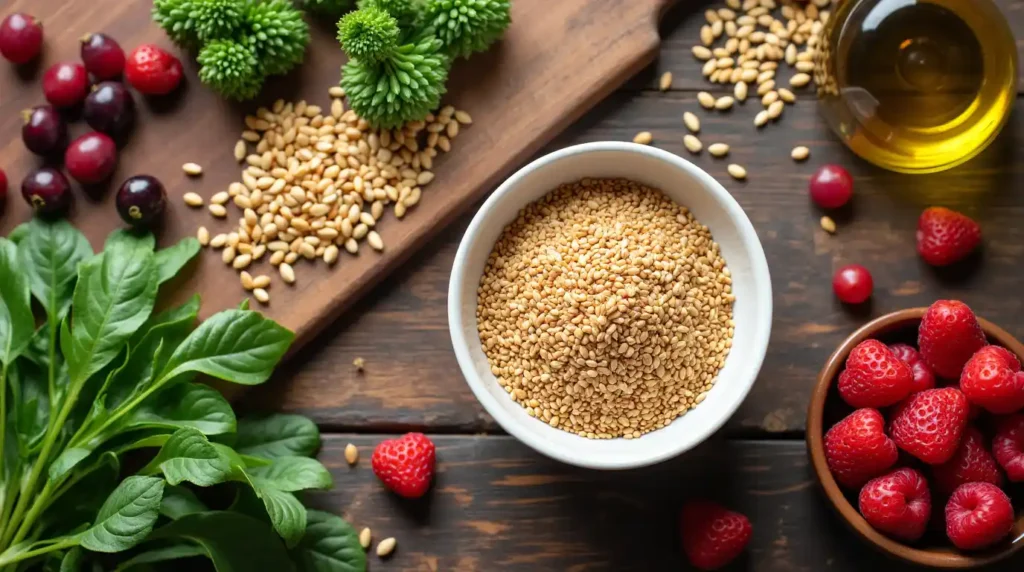
Nourish Your Hormones from the Inside Out
The food you eat doesn’t just fuel your body — it communicates with your hormones.
In this space, you’ll discover how to build a gentle, hormone-smart approach to eating that supports energy, mood, and balance — especially after 40.
Your Hormones Are Talking — Through Your Food
If you’re constantly bloated, tired after meals, or craving sugar — your food choices might be amplifying your hormonal chaos without you knowing.

A Surprising Blueprint for Eating for Hormone Balance: How to Finally Feel Like Yourself Again
Feeling like your body is playing by its own rules? Uncover the surprising connection between your food and key hormones like cortisol & estrogen. This gentle blueprint is your first step to finally feeling like yourself again.

5 Daily Habits That Disrupt Hormones Without Warning
Common mistakes like skipping meals or overeating snacks can silently worsen hormonal symptoms like fatigue, bloating, and cravings after 40.

Why Sugar Cravings Spike Before Your Period
Explore how hormonal shifts trigger sweet cravings — and how smart food swaps help ease PMS without restricting yourself or counting calories.

Bloating After 40? It Might Be Hormonal
Learn how estrogen, cortisol, and gut imbalances contribute to bloating — and what your body might be trying to tell you after meals.
Eat to Feel Better — Not Just to Lose Weight
Restrictive diets don’t work for midlife hormones. Instead, focus on foods that calm inflammation, stabilize blood sugar, and support hormone production.

Top 5 Everyday Foods That Balance Hormones Naturally
Simple nutrient-dense foods like flaxseeds, greens, and eggs can reduce inflammation and support hormonal stability in your daily meals.

What a Hormone-Smart Plate Looks Like Daily
Build balanced meals that stabilize energy and hormones using protein, fiber, healthy fats, and colorful ingredients — no strict diets or calorie tracking.

Meal Timing Affects Cortisol, Cravings, and Energy
When you eat matters as much as what you eat — see how meal timing influences cortisol, blood sugar, and hormonal flow throughout the day.
Make Hormone-Smart Eating a Daily Habit
You don’t need to be perfect — just intentional. These guides help you plan, shop, and eat in a way that supports your long-term balance.

7-Day Hormonal Reset Meal Plan to Feel Better Fast
A flexible weekly meal plan designed to lower inflammation, improve digestion, and restore energy in sync with your hormones.

Smart Grocery List for Hormone-Safe Shopping
Shop with clarity using this easy guide to hormone-friendly groceries — foods that support your balance and avoid disruptors.
Daily Tracker to Link Food, Mood, and Hormones
Use this printable to observe patterns between what you eat and how you feel — a tool for deeper body awareness and healing.
Tools to Support Your Journey

7-Day Hormonal Meal Plan (Printable PDF)
A full week of easy, hormone-friendly meals to help you eat with confidence and nourish your body without restriction.

Hormone-Friendly Grocery Shopping List
Simplify your next grocery run with this complete guide — everything your midlife hormones need, in one smart list.

Track Your Food, Mood & Energy Daily
This simple tracker helps you connect meals to mood and symptoms — and make gentle shifts that stick.
FAQ
Common Questions About Hormonal Nutrition
Can food really help balance hormones?
Yes — nutrition is one of the most effective and natural ways to support your endocrine system, especially in perimenopause and beyond.
How long until I see results?
Most women begin noticing shifts in mood, energy, and symptoms within 2–4 weeks of consistent dietary changes.
Do I need to go gluten-free or dairy-free?
Not necessarily — everyone is different. Our resources focus on flexibility, balance, and personalization.
Ready to Take Your Next Step?
Choose what feels right for you now — whether you want clarity, guidance, or support.

